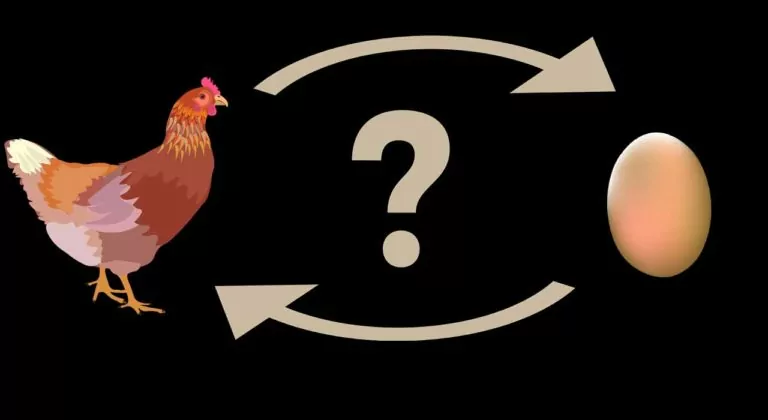There’s no end of mysteries to explore in this weird, wacky, and wonderful universe. How is it that light can be both a particle and a wave? How is it possible that the complexity of a single cell surpasses that of the largest city? And how come there’s no synonym for thesaurus?
Among life’s many questions there’s a small collection that garners special attention – they are the deepest and most unfathomable of them all. Or, at least to secular sorts. It turns out that God has given clear and ready answers to any who have the ears to hear.
Q. Which came first, the chicken or the egg?
A. The chicken.
How can you have one without first having the other? But when we understand that God created everything in just six days then we can conclude that, just as He created Adam full grown, He probably started chickens off with their adult versions too.
Q. If a tree falls in the forest, and there’s nobody around to hear it, does it make a sound?
A. Yes.
Is sound the vibrations in the air, or do those vibrations only become sound when they are heard? Before you answer, consider how there are other vibrations in the air – too low or too high for us to hear – that we consequently don’t regard as sound. However, the problem here is that the premise of the question is wrong: Christians know there is always Somebody around.
Q. How did life begin?
A. With a word.
Evolution has no explanation for the origin of life since evolution’s two mechanisms – natural selection, and random mutation – require an already living, already replicating organism to exist before they can act on it. Just as there is no possibility of selecting until there’s a pool of candidates to select from, there can be no mutation until there’s an original to mutate from. While secular sorts have no answer to give, Christians can read all about life’s origins in Genesis 1 and 2.
Q. Is my glass half empty or half full?
A. Half full.
Nothing we have in life is deserved so if we’re given a glass that’s got water right up to the midway point we should view that gratefully, happy for the gift given.
Q. If you could go back in time and kill Hitler as a baby, should you do it?
A. No.
Abortion advocates have presented a real-life version of this, arguing that legalized abortion lead to a drop in crime because unwanted babies, if they weren’t aborted, would presumably grow up in unloving environments that predispose them to crime. So, the argument goes, there is a benefit to killing them early on. But killing people before they become criminals is itself a crime (Ex. 20:13), not “crime prevention.” The crime-fighting God does allow includes: hugs, spankings, parents, family, mentors, church, police, restitution, and the death penalty. So a better question might be, if you could go back in time and mentor Hitler, should you do it? Of course, that’s more work than pulling a trigger.
Q. If God can do anything, can He make a rock too heavy for Him to lift?
A. No.
God can’t do everything. Specifically, He can’t do anything contrary to His own character. That’s why He can’t ignore sin – His character won’t allow it. And that’s why, to offer us mercy, Jesus had to come to Earth to take our sins on Himself – God could only offer mercy in a way that still satisfied His need for justice. It would also be contrary to His character, as a God of order, to make rocks too heavy for Him to lift…or to make square circles, or any number of other nonsensical things.
Q. Is there life after death?
A. Yes!
Unbelieving sorts will speculate about there being something after life, but Christians don’t have to. That Jesus died and rose again is the assurance of our own resurrection. He’s beaten death!
Q. What is the purpose of life?
A. To glorify God and enjoy Him forever.
Money, fame, power, status, and even family bring only temporary joys. What Man was created for was an eternal relationship with our infinite God.
****
Christians have our own “unanswerable questions” and, well, it turns out some of them have pretty ready answers too.
Who did Cain marry?
A. His sister (or possibly his niece).
While we aren’t supposed to marry relatives now, that prohibition came 2,000 years after Cain’s time (Leviticus 18:6). So why could he marry a close relation and we can’t? The explanation probably comes down to genetics. We all have genetic defects – damaged information in our DNA – but so long as we marry someone unrelated, the effects of those errors won’t generally be seen in our children, as the most serious effects of the error are likely to be countered by the corresponding and error-free section in our spouse’s genes. But close relatives may share the exact same defects, and were they to marry, their children would be more likely to have genetic diseases. This didn’t apply to Adam and Eve, because they started off with perfect genes, and when their children married, they still didn’t have many errors to pass on. It was only after a couple thousand years that genetic errors would have so accumulated that close relatives had to be barred from marrying.
Did Adam have a belly button?
A. No.
Belly buttons are scars from our umbilical cord connection to our mothers, and since neither Adam or Eve was born, neither of them would have had this scar.











